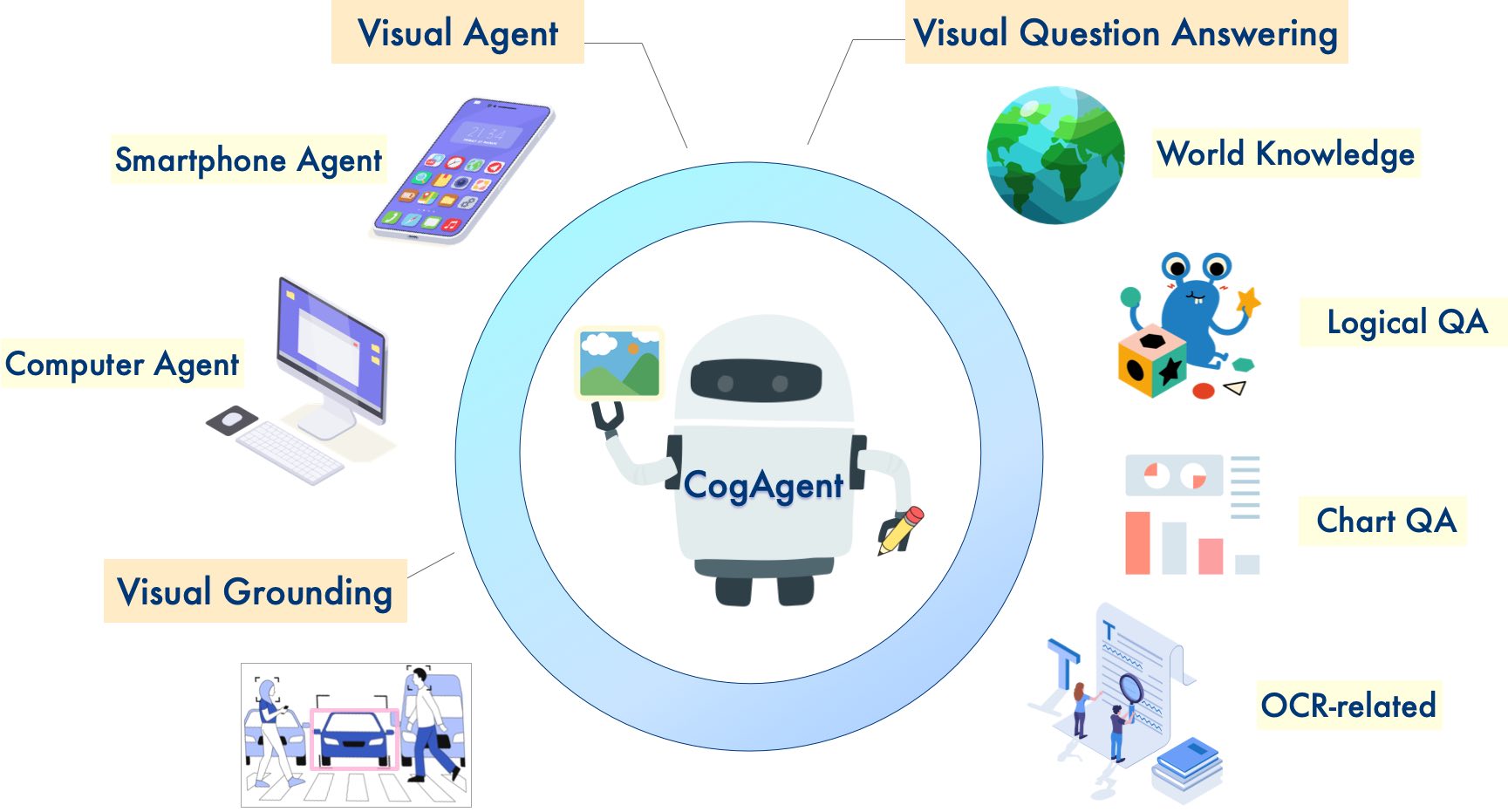CogAgent
🔥 News: The new version CogAgent-9B-20241220 has been released! Welcome to visit CogAgent GitHub and Technical Report to explore and use our latest model.
📖 Paper: https://arxiv.org/abs/2312.08914
📄 Technical Report: https://cogagent.aminer.cn/blog#/articles/cogagent-9b-20241220-technical-report-en
🚀 GitHub: https://github.com/THUDM/CogAgent
🤗 Model Page: https://huggingface.co/THUDM/cogagent-9b-20241220
CogAgent is an open-source visual language model improved based on CogVLM. For more information such as demo, fine-tuning of THUDM/cogagent-chat-hf, and query prompts, please refer to This GitHub
Reminder
📍 This is the cogagent-chat version of CogAgent checkpoint.
We have open-sourced 2 versions of CogAgent checkpoints, and you can choose one based on your needs.
cogagent-chat: This model has strong capabilities in GUI Agent, visual multi-turn dialogue, visual grounding, etc.If you need GUI Agent and Visual Grounding functions, or need to conduct multi-turn dialogues with a given image, we recommend using this version of the model.
cogagent-vqa: This model has stronger capabilities in single-turn visual dialogue.If you need to work on VQA benchmarks (such as MMVET, VQAv2), we recommend using this model.
Introduction
CogAgent-18B has 11 billion visual and 7 billion language parameters.
CogAgent demonstrates strong performance in image understanding and GUI agent:
CogAgent-18B achieves state-of-the-art generalist performance on 9 cross-modal benchmarks, including: VQAv2, MM-Vet, POPE, ST-VQA, OK-VQA, TextVQA, ChartQA, InfoVQA, DocVQA.
CogAgent-18B significantly surpasses existing models on GUI operation datasets, including AITW and Mind2Web.
In addition to all the features already present in CogVLM (visual multi-round dialogue, visual grounding), CogAgent:
Supports higher resolution visual input and dialogue question-answering. It supports ultra-high-resolution image inputs of 1120x1120.
Possesses the capabilities of a visual Agent, being able to return a plan, next action, and specific operations with coordinates for any given task on any GUI screenshot.
Enhanced GUI-related question-answering capabilities, allowing it to handle questions about any GUI screenshot, such as web pages, PC apps, mobile applications, etc.
Enhanced capabilities in OCR-related tasks through improved pre-training and fine-tuning.

Models weight in this repository for academic research is free. Users who wish to use the models for commercial purposes must register here. Registered users may use the models for commercial activities free of charge, but must comply with all terms and conditions of this license. The license notice shall be included in all copies or substantial portions of the Software.
Quick Start
use this python code to get started quickly in cli_demo.py:
import torch
from PIL import Image
from transformers import AutoModelForCausalLM, LlamaTokenizer
import argparse
parser = argparse.ArgumentParser()
parser.add_argument("--quant", choices=[4], type=int, default=None, help='quantization bits')
parser.add_argument("--from_pretrained", type=str, default="THUDM/cogagent-chat-hf", help='pretrained ckpt')
parser.add_argument("--local_tokenizer", type=str, default="lmsys/vicuna-7b-v1.5", help='tokenizer path')
parser.add_argument("--fp16", action="store_true")
parser.add_argument("--bf16", action="store_true")
args = parser.parse_args()
MODEL_PATH = args.from_pretrained
TOKENIZER_PATH = args.local_tokenizer
DEVICE = 'cuda' if torch.cuda.is_available() else 'cpu'
tokenizer = LlamaTokenizer.from_pretrained(TOKENIZER_PATH)
if args.bf16:
torch_type = torch.bfloat16
else:
torch_type = torch.float16
print("========Use torch type as:{} with device:{}========\n\n".format(torch_type, DEVICE))
if args.quant:
model = AutoModelForCausalLM.from_pretrained(
MODEL_PATH,
torch_dtype=torch_type,
low_cpu_mem_usage=True,
load_in_4bit=True,
trust_remote_code=True
).eval()
else:
model = AutoModelForCausalLM.from_pretrained(
MODEL_PATH,
torch_dtype=torch_type,
low_cpu_mem_usage=True,
load_in_4bit=args.quant is not None,
trust_remote_code=True
).to(DEVICE).eval()
while True:
image_path = input("image path >>>>> ")
if image_path == "stop":
break
image = Image.open(image_path).convert('RGB')
history = []
while True:
query = input("Human:")
if query == "clear":
break
input_by_model = model.build_conversation_input_ids(tokenizer, query=query, history=history, images=[image])
inputs = {
'input_ids': input_by_model['input_ids'].unsqueeze(0).to(DEVICE),
'token_type_ids': input_by_model['token_type_ids'].unsqueeze(0).to(DEVICE),
'attention_mask': input_by_model['attention_mask'].unsqueeze(0).to(DEVICE),
'images': [[input_by_model['images'][0].to(DEVICE).to(torch_type)]],
}
if 'cross_images' in input_by_model and input_by_model['cross_images']:
inputs['cross_images'] = [[input_by_model['cross_images'][0].to(DEVICE).to(torch_type)]]
# add any transformers params here.
gen_kwargs = {"max_length": 2048,
"temperature": 0.9,
"do_sample": False}
with torch.no_grad():
outputs = model.generate(**inputs, **gen_kwargs)
outputs = outputs[:, inputs['input_ids'].shape[1]:]
response = tokenizer.decode(outputs[0])
response = response.split("</s>")[0]
print("\nCog:", response)
history.append((query, response))
Then run:
python cli_demo_hf.py --bf16
License
The code in this repository is open source under the Apache-2.0 license, while the use of CogAgent and CogVLM model weights must comply with the Model License.
Citation & Acknowledgements
If you find our work helpful, please consider citing the following papers
@misc{hong2023cogagent,
title={CogAgent: A Visual Language Model for GUI Agents},
author={Wenyi Hong and Weihan Wang and Qingsong Lv and Jiazheng Xu and Wenmeng Yu and Junhui Ji and Yan Wang and Zihan Wang and Yuxiao Dong and Ming Ding and Jie Tang},
year={2023},
eprint={2312.08914},
archivePrefix={arXiv},
primaryClass={cs.CV}
}
@misc{wang2023cogvlm,
title={CogVLM: Visual Expert for Pretrained Language Models},
author={Weihan Wang and Qingsong Lv and Wenmeng Yu and Wenyi Hong and Ji Qi and Yan Wang and Junhui Ji and Zhuoyi Yang and Lei Zhao and Xixuan Song and Jiazheng Xu and Bin Xu and Juanzi Li and Yuxiao Dong and Ming Ding and Jie Tang},
year={2023},
eprint={2311.03079},
archivePrefix={arXiv},
primaryClass={cs.CV}
}
In the instruction fine-tuning phase of the CogVLM, there are some English image-text data from the MiniGPT-4, LLAVA, LRV-Instruction, LLaVAR and Shikra projects, as well as many classic cross-modal work datasets. We sincerely thank them for their contributions.
- Downloads last month
- 548